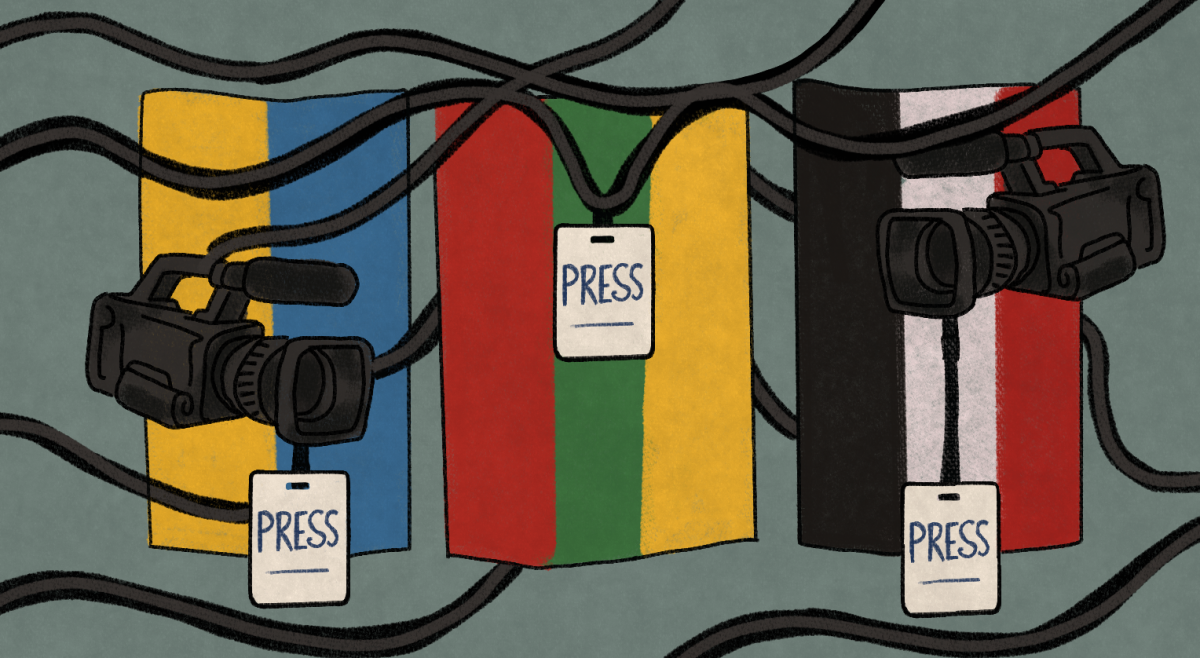Editor’s Note: This is the second installment of DC to BC, a column by Nathan Thomas that explains how federal policies and actions affect the Boston College community.
From Russian aggression in Ukraine to ongoing bloodshed in Yemen and the genocide in Myanmar, pain and suffering has become alarmingly routine. Our society is almost in a state of purgatory.
So is our awareness of it.
This isn’t entirely our fault. The media cycle’s ever-changing nature causes the humanity of these crises to fade behind the headlines. In 2025, many media outlets seek to entertain, not to inform. It’s a simple concept—people have empathy for an emotional story of one, but lack it for a statistic of the many. As a result, even the brightest and most well-intentioned people can fall victim to psychological numbing.
This phenomenon has numbed our response to the rapidly deteriorating geopolitical state of the world. It directly clashes with Boston College’s long-held principles of responding to world needs, global citizenship, and serving others. The pursuit of the common good is not just a slogan—it is an essential component to fulfilling our mission.
We ought to put those principles into action, especially as some of the world’s most most critical, yet largely ignored, crises drag on.
Yemen: The Bloody Wound of the Red Sea
Ever since the 2010 Arab Spring protests, there has been an increased push for democratization and even Westernization in the Middle East. The Yemeni government took up that challeng—they approved an International Monetary Fund–backed plan to cut fuel subsidies, developed counterterrorism methods with the United States to combat Al-Queda in the Arabian Peninsula, and worked with Gulf Cooperation Council (GCC) members like Saudi Arabia to implement anti-corruption reforms. Pledging full allegiance with the United States, Yemeni President Abdrabbuh Mansur Hadi even allowed for U.S. drone strikes and special operations in exchange for weapons and funds.
But the Houthis took offense to that.
Putting resentment into action, a group of Iranian-backed Houthis —an anti-Western, armed religious group based in Yemen—overthrew the Yemeni government in 2014, putting the already divided state on the brink of further unraveling. While the Houthi insurgents had nothing to lose, Saudi Arabia, the United States, and other Western governments risked giving up a regional partner crucial for intelligence sharing and international security efforts. Saudi Arabia had the most to lose, as they had bankrolled Yemen for years to pull them closer to the GCC and push them away from Iran’s encroachment. Thus, it devolved into a proxy war—a Saudi Arabian-led powerplay against the Iranian-backed Houthi government.
The clash between foreign ambition and political extremism has rendered Yemeni citizens an afterthought. Missiles fly, bombs drop, and entire cities are leveled in minutes. Cholera outbreaks, medicine shortages, and famine have forced thousands to flee. The armed conflict and subsequent humanitarian crisis has led to the death of more than 370,000 people.
Yemen bleeds quietly along the shores of the Red Sea—a wound that the world no longer tends to. Despite the potential repercussions for international security, even powerful bodies like the United Nations have failed to address the problem.
The decade-long war and its implications must be more than a quiet mention in an international relations class or a footnote in a foreign policy magazine. While the world looks away, we must look closer—and not flinch.
Myanmar: Genocide in the Shadows
Prior to 2021, Myanmar was making historic strides towards democratization, secure elections, and gender equality—it even elected its female leader, Aung San Suu Kyi, in 2020. That progress was abruptly derailed in 2021, however, when the Burmese military junta waged a coup on the newly formed democratic government. Aung San Suu Kyi was jailed, all three branches of government were dissolved, and the leaders began their vicious crackdown on anyone who dared to oppose them.
In addition to exposing the fragile nature of developing democracies, the coup brought another problem front and center: the Rohingya Crisis. The Muslim ethnic minority has faced persecution since 1982, when the Buddhist-majority Burmese government passed a citizenship law that rendered the Rohingya and other ethnic minorities stateless. The Rohingya nation was denied access to government services, lost the ability to vote, and faced assault and harassment from the military.
Since the coup, the Rohingya have faced a horrific crackdown—towns were burned, thousands were murdered, and more than one million Rohingya were forced to flee to neighboring countries like Bangladesh. The ethnic cleansing and alleged genocide clearly draws from Nazi methodology.
The ground-shattering coup and subsequent Rohingya crisis was only spared a few days of coverage by global media outlets. Even as guerilla warfare persists and the death count ticks up, the media looks elsewhere. And when the media turns away, so do we. If we’re being honest, most Americans likely don’t even know about the Myanmar conflict. That needs to change.
Ukraine: The Numbing Effect of Democratic Resilience
Nearly three years into Russia’s invasion, Ukraine has become a champion of democratic resilience, yet a victim of the world’s attention span. The conflict that once dominated headlines, galvanized international unity, and anchored nearly every political summit has faded to a tired story. At BC—a university that previously organized passionate rallies and even hosted the former Ukrainian Ambassador to the United States for commencement—talk of achieving peace in Ukraine has become muted.
The lack of energy and support for Ukraine in the past year has translated to diminished foreign response to the war. Foreign aid is drying up, pessimism is high, and even the United States has struggled to bridge the gap between Ukrainian President Volodymyr Zelenskyy and Russian President Vladimir Putin.
The harsh reality is that support for Ukraine has fallen out of fashion, and selective empathy has unfortunately never been so relevant. Democracy will not survive on occasional weapons shipments or aid packages. It can only persevere through remembrance, passion, and unity.
The Call to Remain Awake
We got tired of the war in Ukraine, we ignored the war in Myanmar, and we denied the existence of war in Yemen. The lack of action in the international community has led to the continuation of conflict across the globe. The word is in purgatory—geopolitical purgatory.
Genocide, coups, and humanitarian crises plague the earth, whether we choose to recognize them or not. We must stay awake amid a society drifting towards indifference. We must address injustice when it is seemingly invisible. We must confront the issue head on—no matter how uncomfortable it may be.
It would be unreasonable to expect the BC community to broker peace deals, address the UN, and end wars. It is completely reasonable, however, to ask students and faculty to be well-informed, attentive, and understand that we cannot begin to solve problems if we don’t acknowledge them.








